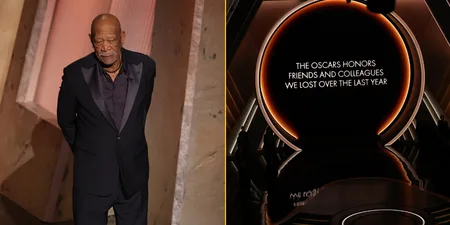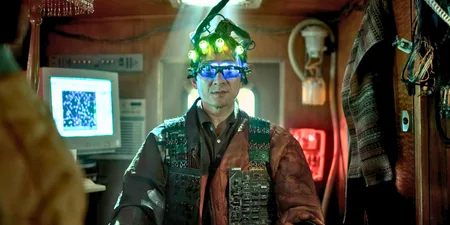There’s a scene in Louis Theroux’s latest documentary that harks all the way back to the days of Weird Weekends
Love Without Limits, the first of three new films, sees Theroux investigate the world of polyamory, or the lifestyle of having romantic relationships with multiple partners for the more vanilla of you out there.
At one point in the film, he attends a ‘sensual feeding’ evening – a cross between a non-sexual orgy and a dinner party, where everyone strips down to their underwear, dons blindfolds, and hand-feeds food to each other as they rub their bodies together.
In the middle of all these free-spirits is Theroux, looking nervous, rigid and confused. It feels like something straight out of his early Weird Weekends episodes. Needless to say the moment is hilarious, but it is also side to Theroux we haven’t seen in a while.
2018 marks Louis Theroux’s 20th year making documentaries for the BBC. Over those two decades, he’s gone from the smart class clown, to someone who makes incredibly powerful and important films. But it is fitting that on this anniversary, his latest film should have such a clear nod back to his early work.
While he’d previously appeared as a reporter on Michael Moore’s short-lived TV Nation, most of us were introduced to Louis Theroux in 1998, with the first series of Weird Weekends. The show introduced the basic format that all his documentaries would follow – a befuddled, bespectacled Englishman embedding himself with a strange or unusual phenomenon, while occasionally raising his eyebrows to the camera.
Speaking at a recent Q&A attended by JOE, Theroux was pretty blunt about his initial appeal: “I just try to be a decent person. Having glasses and being a bit of a geek doesn’t hurt.”
In his early series, Louis would travel across the US, getting into various scrapes. He would attempt to get a part in an off-Broadway musical, or enter a demolition derby, or try to become a bodybuilder. He would film a bit part in a gay porn movie, or attend a swingers party.
Of course, more serious topics were investigated – Louis spent time with Afrikaner separatists, right-wing survivalists, and black nationalists – but comedy was never far from the show’s aims. It was definitely the work of a young man still finding his feet.
“I went into Weird Weekends thinking that it was going to be a legendary TV show, and I will commit everything to it, to making it special and different,” admitted Theroux. “I think it was also a sense of insecurity, I needed to over deliver. I thought I wasn’t naturally talented enough, or someone who should naturally be on TV.”
Those shows remain great fun, but there are definitely moments where it feels like he is trying that bit too hard. The worst of those tendencies would come out in the follow-up to Weird Weekends, When Louis Met…, where instead of interesting subcultures, Theroux spent time with various faded British public figures, such as Chris Eubank or Paul Daniels.
The series would occasionally unearth poignant moments – When Louis Met…Keith Harris & Orville rather touchingly captured the celebrity purgatory of being in panto. But in the era before I’m A Celebrity and Strictly Come Dancing, a big part of the appeal was laughing at past-it D-listers.
It was also the series that featured his notorious film on Jimmy Saville. At the time, the former DJ was regarded as a loveable eccentric, as opposed the monster he was revealed to be after his death, and while Saville comes across as a creepy, lonely old man, watching it now, knowing what we know, it is impossible not to see the film as a failure – something Theroux attempted to correct through a 2016 documentary speaking to Saville’s victims.
Following When Louis Met…, Theroux would make two further films in 2003 – one focusing on a Nevada brothel, and the other investigating Neo-Nazis communities in contemporary America. They are topics that could have been covered in Weird Weekends, but this time they were dealt with in a more serious tone. In these films there was a noticeable lack of comedy eyebrow raises and music stings – and it proved a sign of things to come.
It would be over three years until another Louis Theroux documentary aired on BBC. When he returned, the familiar orange and black branding was gone, and instead, they were released as stand-alone projects.
Over the next decade, Theroux travelled to some of worst places on Earth, mixing with both some of planet’s most evil, and most desperate people. He would visit maximum security prisons in San Quentin and Miami. He would mix with convicted paedophiles, and the notorious Westboro Baptist Church. He would go to streets ravaged by violent crime and drug addiction, as well as speaking to those suffering from anorexia, alcoholism, and dementia.
Gone was the need to participate. He now employed the skills he’d learned through his early work to more potent effect. His quiet, likeable demeanour drawing out the humanity in his subjects, regardless of who they were.
We have increasingly found a kinder, more genuine Theroux. “I think people can see me as someone who isn’t going to be a bully and who is basically trying very hard to read the signals, and not be a dick,” he now says of his infamous interview technique.
“[I do] little things, like offering to take your shoes off when you come in the house. If you having a meal, clear everyone’s plates and offer to do the washing up. Ask if there is anything around that needs doing. Don’t stink up the toilets if you can help it.”
Louis Theroux on his 20th anniversary at the BBC is an older, more mature filmmaker. One who has grown up and had a family. Instead of that cocky young kid of old, there is now no sense that he wants to make a laughing stock out of his subject matter. In fact, he admits to calling up his wife for permission to attend the sensual eating class.
It’s interesting, because at first glance Louis Theroux’s film have hardly changed in two decades. On the surface it is still just him, investigating an offbeat topic, immersing himself with people who live odd lifestyles. Yet a film like Love Without Limits seems miles away from the time he stripped off for a porn producer, or burst into a rap freestyle live on a US radio show.
We now expect a Theroux film to be a heavy, draining and thought provoking. If there has been one consistent, though, it is that his shows have remained effortlessly watchable. And, as we will always be fascinated by the darker corners of life, let’s hope he continues to give us a glimpse into these non-traditional worlds for years to come.
Louis Theroux’s Altered States starts November 4th, 9pm, BBC2, and then will be on iPlayer.







































